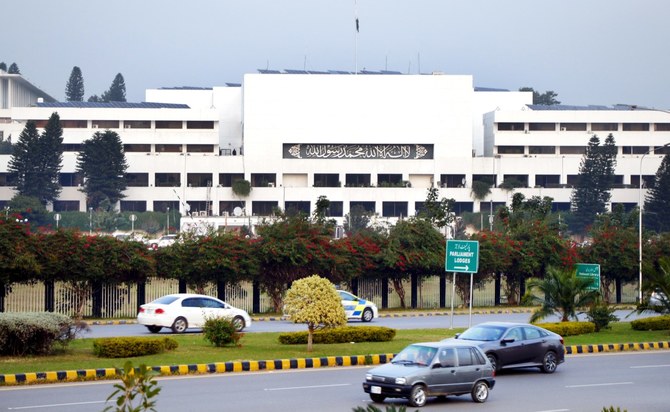ISLAMABAD: The government is weighing options to review a constitutional amendment, which a decade ago granted greater autonomy to provinces.
The 18th Amendment to the Constitution of Pakistan was passed by the National Assembly in 2010, supported by the Pakistan Muslim League-Nawaz (PML-N) and Pakistan People’s Party (PPP).
While it primarily turned Pakistan into a parliamentary republic and removed the power of the president to dissolve the parliament, the amendment also devolved 18 federal ministries to the provinces. It also removed a ban on prime minister serving more than two terms, clearing the way for PML-N chief Nawaz Sharif to take office for a third time in 2013.
Amendment to the amendment has been discussed several times since Prime Minister Imran Khan's party, Pakistan Tehreek-e-Insaf (PTI) came into power in 2018, attracting criticism from the opposition, especially PML-N and PPP.
In its resolve to review the amendment, the ruling party cites the need to fix several flaws and restore federal authority over legislation and financial matters.
"The amendment was a major step towards provincial autonomy in Pakistan, but some flaws have also surfaced in it with the passage of time, which need to be fixed," Minister of State for Parliamentary Affairs Ali Muhammad Khan told Arab News in an interview on Wednesday.
He said that while the government strongly believes in provincial autonomy and would not infringe upon provincial rights, it wants "to improve the 18th amendment in consultation with all parliamentary parties."
He said the federation’s authority over legislation and financial matters has been significantly reduced, as provinces are now autonomous to legislate over subjects such as education and health. "This is problematic in many ways … coordination issues (with provinces) have also come up during coronavirus pandemic," he said.
Meanwhile, opposition parties demand that the amendment be first fully implemented before the government starts negotiations to fix it.
"These are the tactics to distract media and public from real issues," Taj Haider, a senior PPP leader, told Arab News.
He said the federation under the amendment was bound to accept provincial ownership over natural resources and hand over 50 percent of its revenue to the relevant province, but the clause has not been implemented.
"The center is denying us (Sindh province) over Rs200 billion annually in our due share of earnings through natural gas and petroleum products," Haider said.
According to PML-N chairman Raja Zafarul Haq the debate is "untimely and useless." He said, "We should move forward instead of looking back into the history."
"The government should first tell us the flaws in the amendment, and then we will decide what to do," Haq said, adding that his party would look into the issue if the government brings in on in parliament.
Independent experts, however, argue that federal concerns over revenue distribution could be genuine as the center is left with little resources to meet its expenses. Provinces get their share from taxes collected by the government by the Federal Board of Revenue (FBR). In the fiscal year 2011-12, it was increased from 46.5 percent to 57.5 percent, affecting federal development and defense expenditure.
"There is no harm in reviewing the amendment through a democratic process," Ahmed Bilal Mehboob, president of Pakistan Institute of Legislative Development and Transparency (PILDAT), told Arab News. "Constitution is a living document and can be amended anytime, but this should be after thorough debate in the parliament."
The ruling party lacks the necessary two-third majority in both the National Assembly and Senate to amend the 18th amendment on its own.
Calls for constitutional amendment stir debate over provincial autonomy
https://arab.news/n9teg
Calls for constitutional amendment stir debate over provincial autonomy

- 18th amendment passed in 2010 granted financial and legislative autonomy to provinces
- Under the amendment, federation is bound to accept provincial ownership of natural resources
Pakistani superstar Hania Aamir to star alongside India’s Diljit Dosanjh in ‘Sardaar Ji 3’

- Dosanjh announces Sardaar Ji 3 will release on June 27 in theaters around the world except India
- Frequent political tensions between India and Pakistan prevent artists from working with each other
ISLAMABAD: Pakistani superstar Hania Aamir recently shared the trailer of her upcoming Indian Punjabi horror-comedy movie “Sardaar Ji 3” in which she stars alongside famed Indian singer Diljit Dosanjh, announcing that the film will release in cinemas around the world except India on June 27.
Frequent political tensions between bitter rivals India and Pakistan have restricted artists from both countries from working with each other over the years. Indian producers imposed an unofficial ban on Pakistani artists in 2016 after ties deteriorated. Pakistan also banned the screening of Indian movies after relations with New Delhi reached a new low in 2019 over the disputed Kashmir region.

Tensions between India and Pakistan surged in May after they engaged in a days-long military conflict before the United States brokered a ceasefire between them. Several Indian media outlets reported this month that Aamir has been replaced as the female lead from Sardaar Ji 3 following the latest hostilities between the neighbors.
“SARDAAR JI 3 releasing 27th June OVERSEAS only!” Aamir wrote on social media platform Instagram on Sunday, sharing the trailer of the film.
Dosanjh confirmed on his Instagram as well that the movie will not release in India.
“Sardaar Ji 3 releasing 27th June OVERSEAS only,” the Indian actor wrote.
The movie has been directed by Aamr Hundal and other than Dosanjh and Aamir, stars Gulshan Grover, Neeru Bajwa, Jasmin Bajwa and Manav Ji in prominent roles.

As per the film’s trailer, Aamir and Neeru Bajwa both play romantic leads opposite Dosanjh. All three work together as ghost hunters tasked with removing a spirit from a mansion in the UK.
Pakistani actor Fawad Khan and Indian actress Vaani Kapoor’s Bollywood film “Abir Gulaal” was scheduled to release in India on May 9. However, India’s broadcasting ministry said in April it would not allow the film to be released in the country following the April 22 killing of 26 people at a tourist resort in Indian-administered Kashmir.
India accused Pakistan of being involved in the attack, which Islamabad denied. After weeks of tensions, both countries engaged in armed conflict before the ceasefire on May 10.
Pakistan urges UN Security Council to act ‘decisively’ as Iran-Israel conflict intensifies

- Middle East tensions surged on Sunday after US carried out airstrikes against Iran’s nuclear facilities
- Pakistan calls for “peaceful, lasting resolution” to Iran’s nuclear issue via dialogue and diplomacy
ISLAMABAD: Pakistan’s ambassador to the United Nations has urged the Security Council to act “urgently and decisively” to ensure cessation of hostilities in the Middle East, as tensions surge following Washington’s move to join the ongoing conflict between Iran and Israel.
The international community has intensified its calls for peace in the Middle East after US carried out attacks against Iran’s key nuclear facilities on Sunday, joining Israel in the biggest Western military action against the Islamic Republic since its 1979 revolution.
Pakistan’s UN mission announced on Sunday that Islamabad, Beijing and Moscow will present a joint resolution calling for an immediate and unconditional ceasefire in the Middle East. The announcement was made as the Security Council convened an emergency session to discuss US airstrikes on Iranian nuclear sites. Pakistan has strongly condemned the American strikes, reiterating that Tehran reserves the right to respond under the UN Charter.
“As the body entrusted with the primary responsibility for the maintenance of international peace and security, the Security Council must act urgently and decisively,” Pakistan’s Permanent Representative to the UN Asim Iftikhar Ahmad said during the Security Council emergency meeting.
He said it was the Security Council’s collective responsibility to reject and condemn attacks against Iran launched since June 13, stating that they were in “clear contravention” of international law and the UN Charter. The Pakistani envoy reaffirmed that it was the Security Council’s obligation to protect civilian lives and properties on both sides.
Ahmad called for an immediate cessation of hostilities and a “complete ceasefire” in the Middle East.
“Promote urgent recourse to dialogue and diplomacy, consistent with the purposes and principles of the UN Charter, to find a peaceful and lasting resolution to the Iranian nuclear issue,” the Pakistani ambassador said.
Iran on Sunday requested for the UN Security Council meeting, calling on the 15-member body “to address this blatant and unlawful act of aggression, to condemn it in the strongest possible terms” following America’s strikes.
Israel’s UN Ambassador Danny Danon said in a statement on Sunday that the US and Israel “do not deserve any condemnation, but rather an expression of appreciation and gratitude for making the world a safer place.”
UN Secretary-General Guterres branded the US strikes on Iran as a “dangerous escalation in a region already on the edge – and a direct threat to international peace and security.”
Iran’s UN Ambassador Ali Bahreini said Washington had decided to “destroy diplomacy” with its attacks, making it clear that the Iranian military will decide on the “timing, nature and scale” of its response.
Pakistan signs statute to strengthen labor, social protection collaboration among OIC members

- Pakistan signed statute during 51st session of OIC’s Council of Foreign Ministers meeting in Istanbul, says deputy PM
- Many Pakistanis seek employment opportunities abroad, especially in Gulf countries, for better standard of living
ISLAMABAD: Deputy Prime Minister Ishaq Dar recently announced Islamabad had signed the Statute of the Labour Center of the Organization of Islamic Cooperation (OIC) to strengthen collaboration among member states on labor, social protection and human development capital.
The OIC Labour Center is a strategic institution aimed at enhancing labor conditions, promoting employment opportunities and fostering social protection systems across member states. It emphasizes the crucial need to ensure decent work, sustainable social protection and poverty reduction within OIC member states, in alignment with the objectives of the organization’s charter.
In a post on social media platform X on Sunday, Dar announced he had signed the statute at the OIC’s 51st session of the Council of Foreign Ministers in Istanbul from June 21-22.
“This statute is an important step toward strengthening collaboration among OIC Member States on labor, employment, social protection, and human capital development,” the deputy prime minister wrote.
A significant number of Pakistanis seek employment opportunities abroad for a better standard of living as the country grapples with macroeconomic challenges. Saudi Arabia, the United Arab Emirates (UAE) and other Gulf countries are key destinations for Pakistan’s skilled and unskilled workers, whose remittances are vital for the cash-strapped country.
Pakistan’s state media reported in April that the country sent 151,120 skilled laborers to Gulf countries in the first three months of 2025. Senior Pakistani officials have repeatedly spoken of the need to bridge the skills gap and enhance global competitiveness of Pakistani workers, particularly in the Middle Eastern job market.
Pakistan sends approximately one million skilled workers abroad each year to help reduce unemployment and boost foreign exchange reserves through remittances.
High-level Saudi delegation in Pakistan to strengthen parliamentary ties

- Pakistan and Saudi Arabia enjoy strong trade, defense and cultural relations
- The Saudi delegation will meet top Pakistani parliamentarians during the visit
ISLAMABAD: A high-level parliamentary delegation of the Saudi Shoura Council arrived in Pakistan to strengthen parliamentary ties between the two countries, the National Assembly of Pakistan said on Sunday.
The delegation, led by the Head of the Saudi-Pak Parliamentary Friendship Committee Dr. Abdulrahman bin Sanhat bin Abdullah Al-Harbi, is visiting Pakistan on the invitation of Pakistan’s National Assembly Speaker Ayaz Sadiq.
It comprises members of the Saudi Shoura Council and the Saudi-Pak Parliamentary Friendship Committee, Dr. Iman bint Abdulaziz Al-Jabreen and Engineer Salem bin Ali Al-Shahrani.
The delegates held a meeting with NA Speaker Sadiq in Islamabad, during which both sides agreed to promote parliamentary exchanges, according to a statement on the National Assembly of Pakistan’s Facebook page.
“The Pak-Saudi Friendship Group established in the National Assembly is playing an important role in promoting harmony between the parliaments of the two countries,” NA Speaker Sadiq was quoted as saying.
“Exchanges of parliamentary delegations will give the parliamentarians of both countries an opportunity to benefit from each other’s experiences.”
Dr. Abdulrahman said Saudi Arabia attaches great importance to its relations with Pakistan, according to the Pakistani National Assembly statement.
“During the meeting, discussions were held on the unity of the Muslim world, and joint role for peace and development in the region,” it read.
Pakistan and Saudi Arabia enjoy strong trade, defense and brotherly relations. The Kingdom is home to over 2 million Pakistani expatriates, serving as the top destination for remittances for the cash-strapped South Asian country.
Saudi Arabia has also extended significant support to Pakistan during prolonged economic challenges faced by Islamabad in recent years, including external financing and assistance with International Monetary Fund (IMF) loan programs.
Pakistan’s new electric vehicle policy targets 30% green cars by 2030

- The policy aims to cut Pakistan’s reliance on imported fuel, shielding the economy from global oil price fluctuations
- Electric vehicles are also expected to offer long-term savings for consumers through reduced fuel and maintenance costs
ISLAMABAD: Pakistan has unveiled an ambitious New Electric Vehicle Policy (NEVP) 2025–2030 that targets 30% of all new vehicle sales to be electric by 2030, Pakistani state media reported on Sunday.
The policy, which covers cars, buses, motorcycles and rickshaws, aims to accelerate the country’s shift toward sustainable transport, reduce fossil fuel dependence, and curb climate-warming emissions, the state-run APP news agency reported.
Pakistan imports most of its energy needs and the country’s urban areas exhibit some of the world’s highest levels of air pollution, primarily due to sub-2.5 μm particulate emissions. This issue significantly impairs both the country’s economy and the quality of life of its residents.
“Transitioning to electric vehicles (EVs) is critical for a healthier, greener and economically stable future,” Muhammad Saleem Shaikh, a spokesperson for the Climate Change Ministry, told APP, contending that transport sector was a major contributor to air pollution and greenhouse gas emissions in Pakistan.
With the NEVP now in effect, Pakistan, which has seen erratic changes in its weather patterns which experts blame on climate change, joins a growing list of nations pushing for zero-emission mobility to combat climate change and urban pollution.
Mohammad Asif Sahibzada, director-general of the Climate Change Ministry, highlighted that EVs produce zero tailpipe emissions, which will significantly reduce urban smog and help Pakistan meet its international commitments.
“This shift will also lower respiratory and cardiovascular diseases, particularly benefiting children and the elderly,” he added.
The policy aims to cut Pakistan’s reliance on imported fossil fuels, shielding the economy from global oil price fluctuations. EVs are also expected to offer long-term savings for consumers through reduced fuel and maintenance costs.
The government plans to incentivize EV adoption through tax breaks, subsidies, and infrastructure development, including nationwide charging stations.
“Electric vehicles are not just about transport; they are central to Pakistan’s climate action strategy,” Muhammad Azeem Khoso, the ministry’s director for urban affairs, was quoted as saying by the APP.
“This policy marks a decisive step toward a cleaner, more resilient future.”










